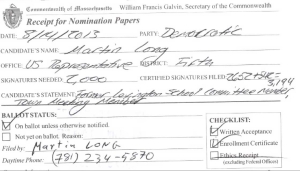There will be much punditry in the coming days on what meaning we can cull from yesterday’s primary. My main takeaway: we just might be on the cusp of reforming party politics in the Commonwealth of Massachusetts by nominating outsiders – those Democrats who are not supported by the closed Democratic Party apparatus.
I’ve got two examples and then a comment on the Gubernatorial race.
First, with 98% of the precincts counted, Maura Healey routed Warren Tolman for the Democratic nomination for Attorney General (62% to 38%). Healey is just the kind of candidate we need in statewide office and I’m tickled pink that she won. Now I know Warren Tolman (he was one of only two politicians that impressed me last year when I was running for the Democratic nomination in the 5th Congressional district). I like him and he’s clearly a smart and informed guy. But I completely disagreed with his campaign strategy of running to be an “activist” AG. It sounded to me that Tolman really wanted to be governor, so he ran for AG as a stepping stone.
Maura Healey, in contrast, focussed on her experience in the AG’s office, with civil rights cases, e.g., and actually prosecuting cases. You know, the stuff of an attorney general. Virtually all of the Democratic political insiders supported Tolman. Even Gov. Patrick endorsed him earlier in the week. Why? Well they (a) knew him; (b) agreed with him politically; and (c) liked him. There you go. Great reasons for supporting a candidate.
Unfortunately, in Massachusetts we have a very closed Democratic party apparatus. They rarely support outside voices, preferring instead to stick with known quantities. Unfortunately, what this means is that over time these known quantities become beholden to those party insiders. This isn’t about ideology. No, Healey and Tolman agreed on all of the major progressive issues. So why did the insiders support Tolman? They knew him, agreed with him and liked him. And so they gave Maura Healey not a second look.
Put aside my differences with Tolman over the proper role of an AG for a moment. If two candidates are both competent, intelligent, hard-working and agree with me on the issues, I will always vote for the outsider. Professional politicians in this state (and in the country writ large) are at the root of our problems. Where there is concentrated power, seemingly unchallengeable and entrenched power, we must work hard to check that power. That just as valid in our state as it is on the national level.
For our second race, let’s move on to the 6th Congressional district where political newcomer Seth Mouton displaced the nine-term member of Congress, John Tierney as the Democratic nominee. Yes, Tierney had his ethical problems. That’s likely what did him in (it is notoriously difficult to unseat a member of Congress in their own party’s primary). But I’d still like to rejoice that we will likely have an outsider as a member of Congress. When was the last time that happened in Massachusetts? A long, long time ago for sure. Joe Kennedy (4th district) doesn’t count (a Kennedy can never claim outsider status). And Katherine Clark in the 5th district doesn’t count either (she’s been a politician moving up the ladder in Massachusetts for ages).
We also had an outsider running for governor: Don Berwick. Unfortunately, he couldn’t win in a three-way race against Martha Coakley and Steve Grossman. And regardless of how Coakley tries to position herself as a candidate not of the party elite, she’s a professional politician thru and thru. And a bad one too. Oh sure, I agree with most of her politics. But let’s face it: she’s the one who gave us Scott Brown. She’s the one person in the country most responsible for the Democrats losing a filibuster-proof majority in the Senate. She did it by running an absolutely miserable campaign. Don’t want to be the attorney general anymore? Lost a Senate race? Okay then, how about governor? Please. That is the definition of a professional politician.
Sadly, Coakley will almost certainly lose to Republican nominee Charlie Baker in November. So please don’t forget Don Berwick. We’ll need him in four years to run against a Governor Baker. Such a shame.
Moral? Progressive Democrats need to stop listening to the political clique that runs things in Massachusetts, and start voting for new candidates, independent Democrats, into office. There are plenty of possible candidates who are just as progressive as those who are supported by the political elite, but aren’t hampered by the groupthink and political control of those who are running things. These prospective candidates can be smart and likable, but they’re not able to be controlled by Democratic clique. That’s why they’re not supported, even ignored by the party. And that’s precisely why we should be voting them in.
In another state we’d have a robust Republican opposition. And I’m most definitely not a Republican. Since the GOP is anemic in our state we as Democrats need to step up ourselves and reform our own party from within. We’ve just barely started. Now let’s get this ball rolling.

